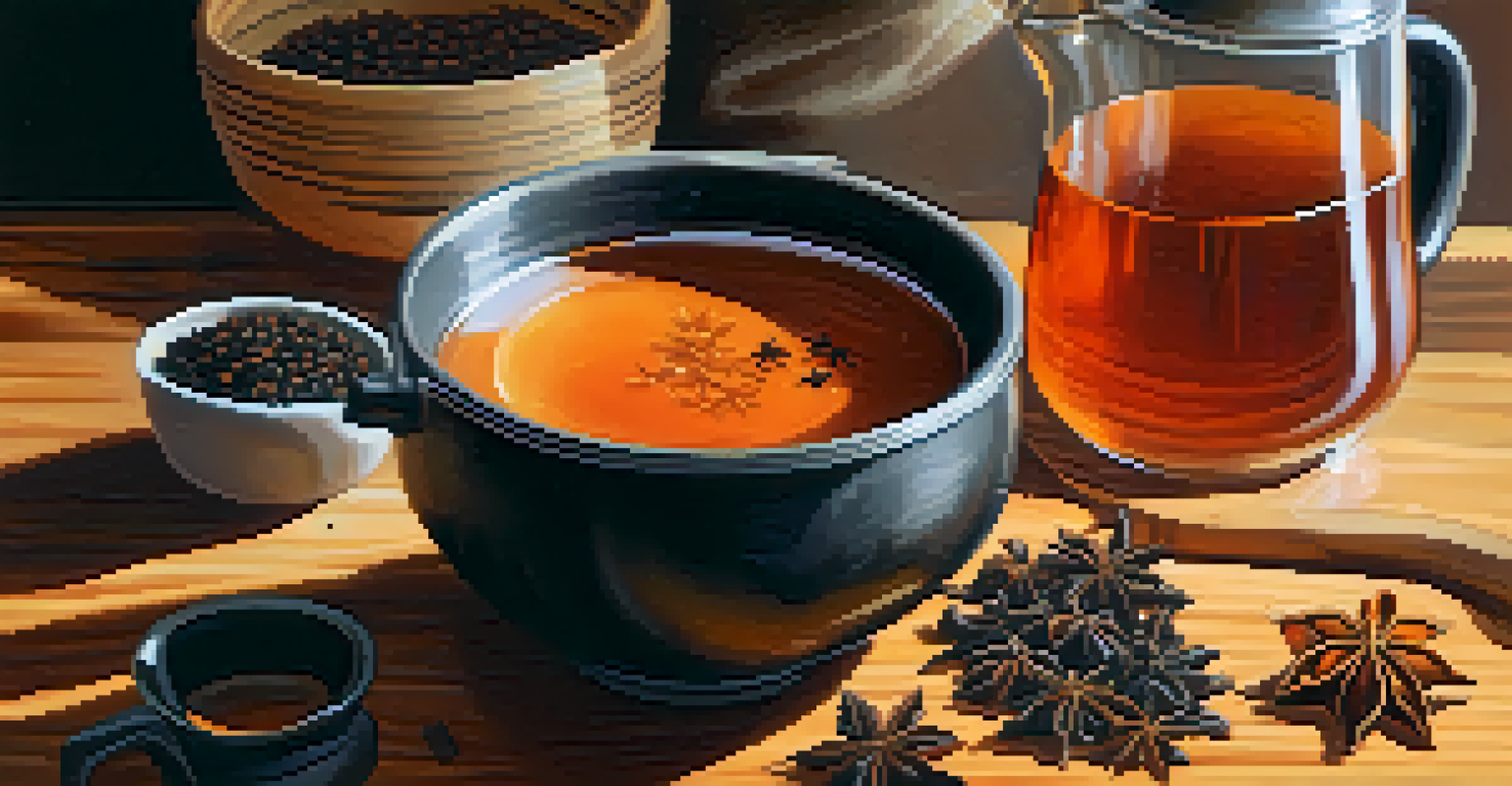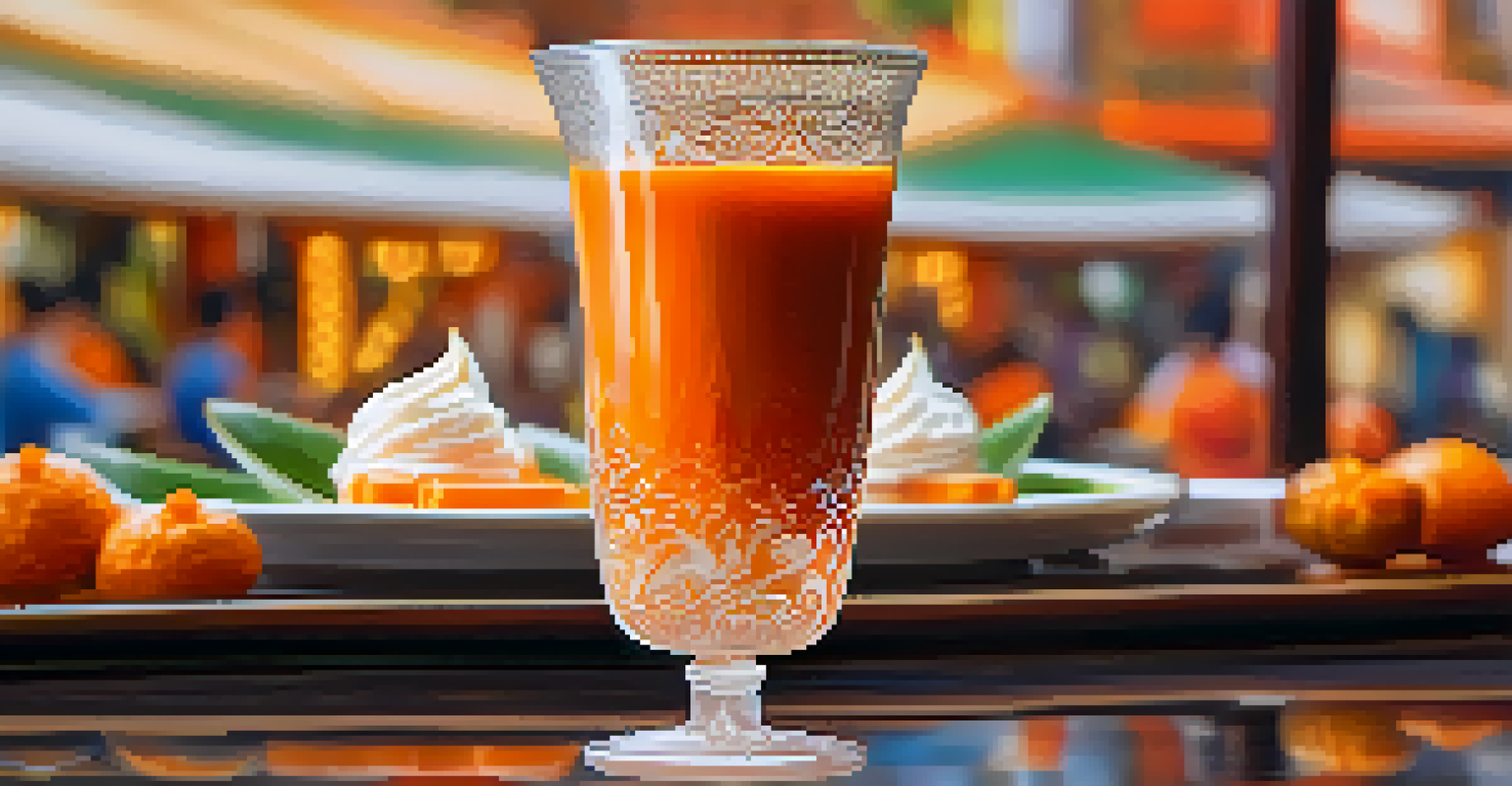The Art of Brewing Thai Tea: Techniques and Traditions

Exploring the Rich History of Thai Tea Brewing
Thai tea, known for its vibrant color and unique flavor, has a rich cultural history. Originating from the tea plantations of Southeast Asia, it has become an integral part of Thai cuisine. The traditional brewing methods reflect the blending of Thai and Chinese customs, showcasing how cultural exchanges shape beverages.
Tea is the magic key to the vault where my brain is kept.
In the early days, tea was primarily enjoyed by the elite, but as it became more accessible, it evolved into a beloved drink among all social classes. Today, Thai tea is not just a drink; it’s a ritual that brings people together, whether at street stalls or family gatherings. The process of preparing it is steeped in tradition, making each cup a story.
Understanding this history is essential for appreciating the art of brewing Thai tea. It’s not just about the ingredients; it’s about honoring the customs and practices passed down through generations. This connection to the past enriches every sip and enhances the overall experience.
Key Ingredients for Authentic Thai Tea
To brew authentic Thai tea, the choice of ingredients is crucial. The base is typically a robust black tea, often flavored with spices like star anise and crushed tamarind. These additions contribute to the tea's distinctive taste and aroma, setting it apart from other varieties.

Another essential ingredient is sweetened condensed milk, which adds creaminess and sweetness, creating a perfect balance with the bold flavors of the tea. Some recipes also incorporate evaporated milk or coconut milk for a richer texture. Each variation offers a unique twist, allowing for personal preferences.
Thai Tea's Cultural Significance
Thai tea is not just a beverage; it embodies a rich cultural history that reflects the blending of traditions and brings people together.
Using high-quality tea leaves and fresh ingredients can significantly impact the final flavor. It’s worth seeking out authentic Thai tea leaves from specialty stores or online suppliers. This attention to detail not only honors the tradition but also elevates the overall brewing experience.
Traditional Brewing Techniques for Thai Tea
Brewing Thai tea is an art that requires patience and precision. Start by boiling water and steeping the black tea leaves for about 10-15 minutes, allowing the flavors to fully develop. The longer steeping time intensifies the tea's color and taste, resulting in that iconic deep orange hue.
There is something in the nature of tea that leads us into a world of quiet contemplation of life.
After steeping, strain the tea to remove the leaves, ensuring a smooth texture. At this stage, you can add the spices, adjusting the flavor profile to your liking. The next step involves mixing in the sweetened condensed milk, which transforms the tea into a creamy, delightful beverage.
For those who prefer a cold drink, let the tea cool and serve it over ice. This refreshing version is especially popular in the warm climate of Thailand. Regardless of how you choose to enjoy it, the brewing technique remains a crucial part of the experience.
The Role of Presentation in Thai Tea Culture
In Thai culture, presentation plays a vital role in the enjoyment of food and beverages, and Thai tea is no exception. The striking orange color of the tea, often layered with cream, creates a visual feast that enhances the drinking experience. A well-presented cup invites admiration and appreciation.
Serving Thai tea in a clear glass allows the vibrant colors to shine, while garnishes like mint leaves or a slice of lime add a refreshing touch. This attention to detail not only elevates the beverage but also reflects the host's care and hospitality.
Key Ingredients Matter
The choice of robust black tea, spices, and sweetened condensed milk is crucial for crafting an authentic and flavorful Thai tea experience.
Moreover, the act of sharing tea with friends and family fosters a sense of community. Whether it's in a bustling market or a quiet home, the presentation of Thai tea is a celebration of culture and togetherness, making every cup special.
Variations of Thai Tea: A World of Flavors
While traditional Thai tea is beloved, there are countless variations that cater to different tastes. For example, Thai iced tea is a popular choice, served cold over ice with milk and sugar. This refreshing option is perfect for hot days and has become a favorite among tea lovers worldwide.
Another delightful variation is Thai tea with fruit flavors, where ingredients like mango or coconut are incorporated. These fruity additions create a unique twist that appeals to those seeking something different. Experimenting with flavors is encouraged, allowing for creativity in the brewing process.
Moreover, herbal versions of Thai tea are gaining popularity, offering a caffeine-free alternative. These blends often include herbs like lemongrass or pandan, providing a refreshing and aromatic experience. Each variation showcases the versatility of Thai tea, making it a delightful choice for everyone.
Health Benefits of Thai Tea: Sip with Purpose
Beyond its delightful flavors, Thai tea also offers several health benefits. The black tea base is rich in antioxidants, which can help combat oxidative stress and promote overall health. Drinking tea regularly has been linked to improved heart health and enhanced mental clarity.
The addition of spices like star anise also contributes to its health properties. These spices are known for their anti-inflammatory benefits and can aid in digestion. This means that sipping on Thai tea can be both indulgent and beneficial, making it a guilt-free treat.
Brewing Techniques Enhance Flavor
Mastering the traditional brewing techniques, including proper steeping time and ingredient mixing, is essential for achieving the perfect cup of Thai tea.
However, moderation is key, especially with sweetened condensed milk. While it adds delicious creaminess, it's important to be mindful of sugar intake. Enjoying Thai tea as part of a balanced diet allows you to savor its richness while reaping the health benefits.
Tips for Brewing the Perfect Cup of Thai Tea
Brewing the perfect cup of Thai tea can be a rewarding experience, and a few tips can help you achieve that. First, always use fresh ingredients to ensure the best flavor. Stale tea leaves can result in a dull taste, so opt for quality products whenever possible.
Secondly, don’t rush the brewing process. Allowing the tea to steep properly is crucial for achieving that rich color and flavor. Patience pays off, and the longer infusion time can make a significant difference in the final result.

Lastly, experiment with sweetness and creaminess levels to find your ideal balance. Some prefer their tea sweeter, while others enjoy a more robust flavor. Personalizing your brew is part of the joy of making Thai tea, so have fun with the process!